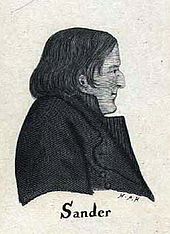Christian Levin Sander
Christian Levin Sander , also Levin (Laevinus) Christian Sander, Christian Friedrich Sander (born November 13, 1756 in Itzehoe , † July 29, 1819 in Copenhagen ) was a German and Danish poet and educator. Initially he published mainly under the pseudonyms: “Dr. Eckstein ”,“ Magister Rosengluth ”or“ Christoph Bachmann ”.
Life
Since Sander was sickly from early childhood, he only attended school irregularly. As an autodidact, he soon developed a fondness for beautiful literature. As a private tutor he taught from 1774 to Martin Ehlers in Altona, the rector of the Christianeum there, through whom he made the acquaintance of Friedrich Gottlieb Klopstock, Johann Heinrich Voss, Matthias Claudius, Johann Christoph Unzer and the brothers Christian and Friedrich Leopold Graf zu Stolberg. From 1776 on, Sander studied at Kiel University before he switched to the Dessau Philanthropin as a teacher and educator in 1778. After falling ill again and a long stay with Johann Wilhelm Ludwig Gleim in Halberstadt, Sander went to Copenhagen in 1784 as a private tutor to the Minister of State Christian Detlev Graf von Reventlow, which he was never to leave again. In 1789 he entered the Danish civil service; initially as an authorized representative at the Royal Credit Fund, from the end of August 1791 as secretary of the Danish Roads Commission.
When the pedagogical seminar was founded for the training of teachers at learned schools, Sander received a professorship for pedagogy and rhetoric in January 1800; he also taught German language and literature there. In 1811 the seminary was affiliated with the University of Copenhagen, where Sander is considered to be the first “Germanist” today.
At the age of nineteen, Sander wrote his first drama Golderich und Tasso in 1775 ; During the Dessau period a series of pieces for the school stage followed. However, he was best known as the poet of the first Danish historical drama in the Danish language: In 1797 he became overnight with the premiere of his "national tragedy" Niels Ebbesen af Nörreriis (German version by Sander 1798), which was also his first poem in Danish celebrated Danish national poet. This drama about a historical, German-Danish conflict in the Middle Ages remained his greatest success throughout his life; until 1834 it was regularly on the repertoire of the Copenhagen Royal Theater. Sander wanted to build on the success of Ebbesen in 1809 with his second German-Danish medieval drama : Knud, Danmarks Hertug (German by Sander 1810/11). But the piece was canceled after a few performances.
Sander emerged as a novelist with the three-volume novel The Story of My Friend, Bernhard Ambrosius Rund (1783/84), as well as a Gargantua adaptation based on Rabelais and Johan Fischart. An extensive oeuvre of smaller z. He published some lyrical poems, songs, tales and fables in German in Wielands Teutschem Merkur , the Musenalmanach von Voss, in Heinrich Christian Boies Deutschem Museum and Friedrich Gedike and Johann Erich Biester's Berlin monthly . During the English attacks on Copenhagen in 1801 and 1807, Sander wrote a number of patriotic German- and Danish-language war songs; In the last years of his life he preferred to write sacred (casual) poetry.
In addition, Sander also worked as a translator of contemporary Danish poets into German (including texts by Jens Baggesen, Knud Lyhne Rahbeks, Johannes Ewald, Christen Henriksen Prams), as well as Mendel Levin Nathanson's life of councilor David Amsel Meyer . Sander also published his educational lectures, essays on pedagogy and aesthetics, a textbook on the German language and several treatises on the art of declamation.
Sander was married twice: On August 9, 1802 he married Johanna Augusta Charlotte Amalia von Grube (born August 23, 1775 in Copenhagen, † April 5, 1818 in Copenhagen). After her death, Sander married Maria Sophie Baronesse de Clozell (born July 4, 1769 in Copenhagen; † April 16, 1834 in Roskilde) on March 19, 1819, just a few months before his death.
Works
- Golderich and Tasso . Tragedy, Flensburg and Leipzig 1778
- Story of my friend, Bernhard Ambrosius Rund . 3 volumes. Hamburg 1784
- Gargantua and Pantagruel . 3 volumes. Hamburg 1785–1787
- Niels Ebbesen af Nörreriis. Et Sörgespil . Copenhagen 1798; 1799 (German Ebbesen v. Nörreriis. Trauerspiel . Copenhagen 1798; Graz 1799)
- Eropolis. Lyrisk Skuespil . Copenhagen 1803 (German Eropolis. Lyric drama . Copenhagen / Leipzig 1804)
- Knud, Danmarks Hertug. Et Sørgespil . Copenhagen 1808; German Knud Laward. Tragedy . 2 parts, Leipzig 1810
- Forelæsninger about Shakspeare and hans Sørgespil Macbeth . Copenhagen 1804
- Odeum: eller Declamereconstens theory . Copenhagen 1808; 2nd edition 1819
- Polyhymnia, Euterpe and Theone; or theoretical ligning of music, rhythm and declamation . Copenhagen 1813
literature
- Andreas Blödorn: Between the languages. Models of transcultural literature with Christian Levin Sander and Adam Oehlenschläger . Göttingen 2004, ISBN 3-525-20595-3
- Franz Brümmer : Sander, Christian Lävin . In: Allgemeine Deutsche Biographie (ADB). Volume 30, Duncker & Humblot, Leipzig 1890, p. 347 f.
- Christian Levin Sander . In: Carl Frederik Bricka (Ed.): Dansk biografisk Lexikon. Tillige omfattende Norge for Tidsrummet 1537-1814. 1st edition. tape 14 : Resen – Saxtrup . Gyldendalske Boghandels Forlag, Copenhagen 1900, p. 596 (Danish, runeberg.org ).
Web links
- Literature by and about Christian Levin Sander in the catalog of the German National Library
- Works by and about Christian Levin Sander in the German Digital Library
| personal data | |
|---|---|
| SURNAME | Sander, Christian Levin |
| ALTERNATIVE NAMES | Sander, Levin Christian; Sander, Laevinus Christian; Sander, Christian Friedrich; Dr. Eckstein (pseudonym); Rosengluth, Magister (pseudonym); Bachmann, Christoph (pseudonym) |
| BRIEF DESCRIPTION | German and Danish poet and educator |
| DATE OF BIRTH | November 13, 1756 |
| PLACE OF BIRTH | Itzehoe |
| DATE OF DEATH | July 29, 1819 |
| Place of death | Copenhagen |
